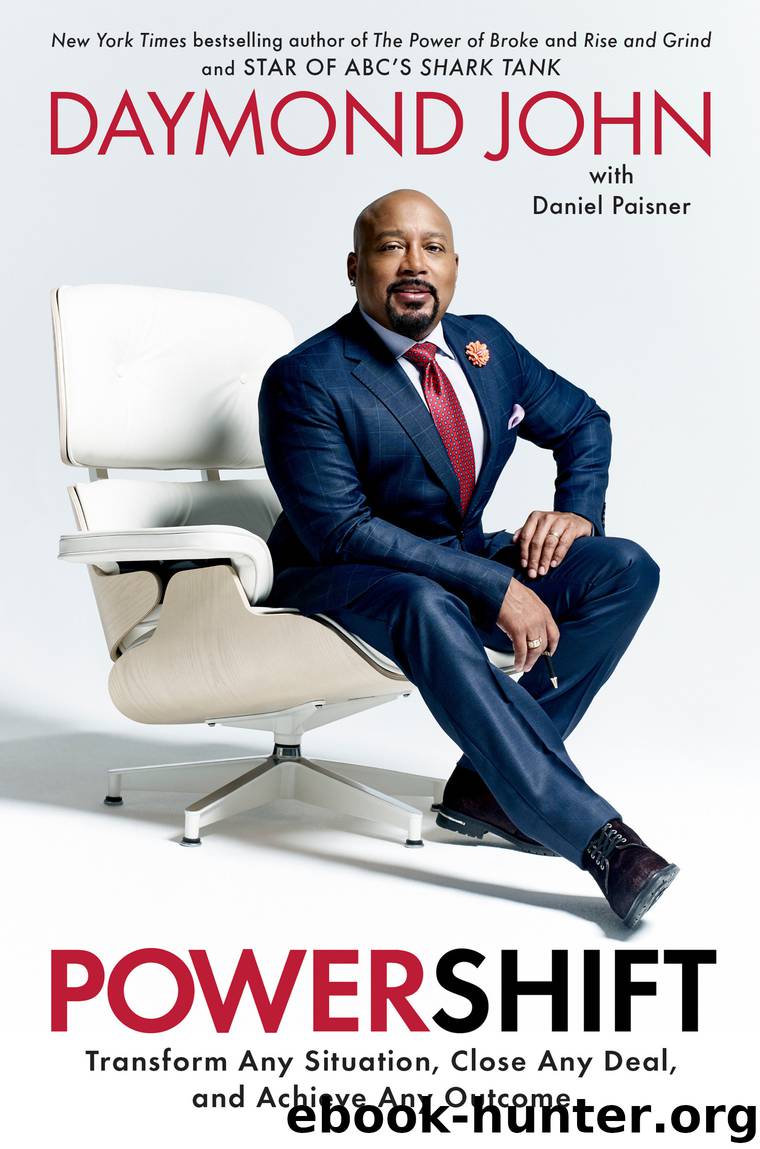Powershift by Daymond John & Daniel Paisner

Author:Daymond John & Daniel Paisner
Language: eng
Format: epub
Publisher: Crown
Published: 2020-03-09T16:00:00+00:00
My role on Shark Tank gives me a front-row seat to the many ways aspiring entrepreneurs and innovators pitch their businesses and products. Some of them prepare for the big day by learning everything there is to know about their market and their competitors, memorizing every dollar amount or data point relevant to their financial picture, and trying to anticipate every question we might throw at them. Others take a more seat-of-the-pants approach and figure they can just wing it once the cameras are rolling. Most fall somewhere in between.
Still, even after eleven seasons, those people who walk in there without a well-thought-out pitch always catch me by surprise. It happens all the time, and when it does I scratch my head and wonder how lazy or stupid or full of yourself you have to be to get this amazing opportunity to pitch your business or product on Shark Tank and kick it to the curb in this way. It’s like going for a job interview without even doing the most basic, Wikipedia-type research on a company. Something you might think everyone knows to do, right? Wrong. You’d be surprised to know that according to a CareerBuilder survey, only 64 percent of candidates actually research a company online after applying, and 67 percent of candidates will continue with their application even if they cannot find any information online about the company. You definitely don’t want to be that candidate that shows up to an interview with no knowledge about the company, and that’s exactly how the entrepreneurs who pitched to us on Shark Tank without doing their research on us appeared. We saw a lot more of these dud pitches early on, before the show became a kind of cultural marker and an obvious make-or-break opportunity for people lucky enough to make it onto our set. But even now we get our share of entrepreneurs who show up totally unprepared. It’s gotten to the point where some of the viewers know what makes a good or bad pitch better than the person up there making it. I can picture people sitting at home watching and yelling at the television set like it’s a horror movie—only instead of “don’t go into the basement!” they’re yelling “offer another 5 percent!”
People are always asking how to get on the show, or what they should do if they make it to the Tank. The first question, I’m not really able to answer—the producers have that one figured out. But the second question, I’m able to share what I look for in a pitch. It’s tough to generalize, because every pitch is different, every prospect is different. Sometimes I’m listening for an opportunity in a field I already know something about, and sometimes I’m intrigued by a business that’s entirely new to me. What usually happens, though, is that I’m looking at three main components in the pitch—and they all come down to how well (or how little!) the entrepreneur prepared for this moment.
Here are those components:
The first thing I look for is confidence.
Download
This site does not store any files on its server. We only index and link to content provided by other sites. Please contact the content providers to delete copyright contents if any and email us, we'll remove relevant links or contents immediately.
Hit Refresh by Satya Nadella(9132)
The Compound Effect by Darren Hardy(8965)
Change Your Questions, Change Your Life by Marilee Adams(7780)
Nudge - Improving Decisions about Health, Wealth, and Happiness by Thaler Sunstein(7706)
The Black Swan by Nassim Nicholas Taleb(7129)
Deep Work by Cal Newport(7083)
Rich Dad Poor Dad by Robert T. Kiyosaki(6632)
Daring Greatly by Brene Brown(6512)
Principles: Life and Work by Ray Dalio(6446)
Playing to Win_ How Strategy Really Works by A.G. Lafley & Roger L. Martin(6302)
Man-made Catastrophes and Risk Information Concealment by Dmitry Chernov & Didier Sornette(6019)
Big Magic: Creative Living Beyond Fear by Elizabeth Gilbert(5771)
Digital Minimalism by Cal Newport;(5764)
The Myth of the Strong Leader by Archie Brown(5507)
The Slight Edge by Jeff Olson(5417)
Discipline Equals Freedom by Jocko Willink(5389)
The Motivation Myth by Jeff Haden(5212)
The Laws of Human Nature by Robert Greene(5208)
Stone's Rules by Roger Stone(5087)
